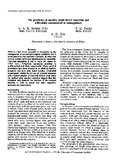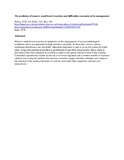| dc.contributor.author | Barros, D'Sa AA | |
| dc.contributor.author | Parks, TG | |
| dc.contributor.author | Roy, AD | |
| dc.date.accessioned | 2013-06-11T09:19:10Z | |
| dc.date.available | 2013-06-11T09:19:10Z | |
| dc.date.issued | 1978 | |
| dc.identifier.citation | The problems of massive small bowel resection and difficulties encountered in management. Barros D'Sa AA, Parks TG, Roy AD. Postgrad Med J. 1978 May;54(631):323-7 | en |
| dc.identifier.uri | http://erepository.uonbi.ac.ke/handle/123456789/31393 | |
| dc.identifier.uri | http://www.ncbi.nlm.nih.gov/pubmed/97646 | |
| dc.description.abstract | Massive small bowel resection is imperative in the management of several pathological conditions and is accompanied by high operative mortality. In those that survive, serious nutritional disturbances are inevitable. Intestinal adaptation is said to occur but cannot be relied upon. Long-term parenteral nutrition is problematical and often unsuccessful. Many surgical procedures have been adopted in an effort to improve prognosis and have been found wanting. Controlled experimental studies in the use of reversed segments and a limited number of reported clinical cases using the method after massive resection suggest that this technique may improve the function of the residual intestine to such an extent that other supportive measures are unnecessary. | en |
| dc.language.iso | en | en |
| dc.title | The problems of massive small bowel resection and difficulties encountered in management. | en |
| dc.type | Article | en |
| local.publisher | Surgery, The Queen's University of Belfast | en |


